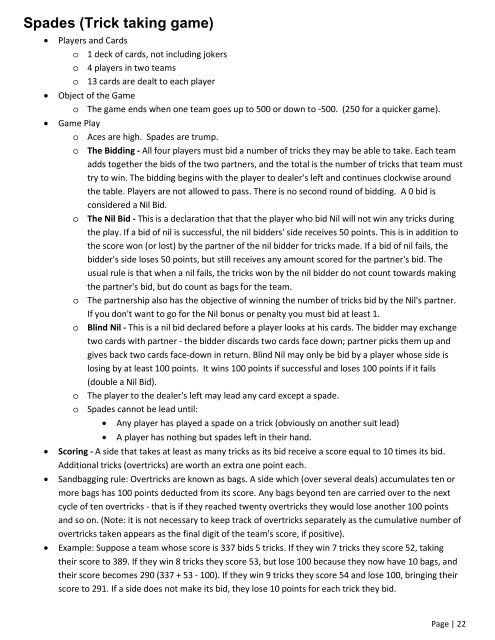Create successful ePaper yourself
Turn your PDF publications into a flip-book with our unique Google optimized e-Paper software.
Spades (Trick taking game)<br />
�� Players and <strong>Card</strong>s<br />
o 1 deck of cards, not including jokers<br />
o 4 players in two teams<br />
o 13 cards are dealt to each player<br />
�� Object of the <strong>Game</strong><br />
o <strong>The</strong> game ends when one team goes up to 500 or down to -500. (250 for a quicker game).<br />
�� <strong>Game</strong> Play<br />
o Aces are high. Spades are trump.<br />
o <strong>The</strong> Bidding - All four players must bid a number of tricks they may be able to take. Each team<br />
adds together the bids of the two partners, and the total is the number of tricks that team must<br />
try to win. <strong>The</strong> bidding begins with the player to dealer's left and continues clockwise around<br />
the table. Players are not allowed to pass. <strong>The</strong>re is no second round of bidding. A 0 bid is<br />
considered a Nil Bid.<br />
o <strong>The</strong> Nil Bid - This is a declaration that that the player who bid Nil will not win any tricks during<br />
the play. If a bid of nil is successful, the nil bidders' side receives 50 points. This is in addition to<br />
the score won (or lost) by the partner of the nil bidder for tricks made. If a bid of nil fails, the<br />
bidder's side loses 50 points, but still receives any amount scored for the partner's bid. <strong>The</strong><br />
usual rule is that when a nil fails, the tricks won by the nil bidder do not count towards making<br />
the partner's bid, but do count as bags for the team.<br />
o <strong>The</strong> partnership also has the objective of winning the number of tricks bid by the Nil's partner.<br />
If you don't want to go for the Nil bonus or penalty you must bid at least 1.<br />
o Blind Nil - This is a nil bid declared before a player looks at his cards. <strong>The</strong> bidder may exchange<br />
two cards with partner - the bidder discards two cards face down; partner picks them up and<br />
gives back two cards face-down in return. Blind Nil may only be bid by a player whose side is<br />
losing by at least 100 points. It wins 100 points if successful and loses 100 points if it fails<br />
(double a Nil Bid).<br />
o <strong>The</strong> player to the dealer's left may lead any card except a spade.<br />
o Spades cannot be lead until:<br />
�� Any player has played a spade on a trick (obviously on another suit lead)<br />
�� A player has nothing but spades left in their hand.<br />
�� Scoring - A side that takes at least as many tricks as its bid receive a score equal to 10 times its bid.<br />
Additional tricks (overtricks) are worth an extra one point each.<br />
�� Sandbagging rule: Overtricks are known as bags. A side which (over several deals) accumulates ten or<br />
more bags has 100 points deducted from its score. Any bags beyond ten are carried over to the next<br />
cycle of ten overtricks - that is if they reached twenty overtricks they would lose another 100 points<br />
and so on. (Note: it is not necessary to keep track of overtricks separately as the cumulative number of<br />
overtricks taken appears as the final digit of the team's score, if positive).<br />
�� Example: Suppose a team whose score is 337 bids 5 tricks. If they win 7 tricks they score 52, taking<br />
their score to 389. If they win 8 tricks they score 53, but lose 100 because they now have 10 bags, and<br />
their score becomes 290 (337 + 53 - 100). If they win 9 tricks they score 54 and lose 100, bringing their<br />
score to 291. If a side does not make its bid, they lose 10 points for each trick they bid.<br />
Page | 22


